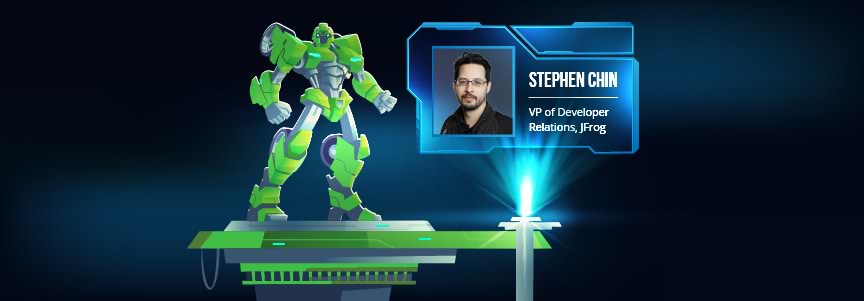International Programmers Day 2021: Celebrating Those on the Front Lines of Digital Transformation
Happy International Day of the Programmer to the coders out there programming our digital world. It is your work and commitment that make the technical community thrive. You create the foundation for the innovations transforming the way we work and live. In honor of International Day of the Programmer and spirit of transformation, we’re going to take a closer look at a handful of JFrog employees who started out as programmers and transitioned their career trajectory to become developers and technical thought leaders who have revolutionized the products we use and the way we do business.
How the Role of the Programmer is Changing
Companies today are increasingly defined by the customer experience they deliver and — generally speaking – that “face to the customer” is through an app. Software is a key enabler of today’s businesses, and programmers and developers are the “Transformers” on the front lines of this wave of digital transformation.
The role of today’s modern developer, programmer, or DevOps engineer extends well beyond creating and managing the software development lifecycle. Their role is evolving; they are insightful, resourceful, alliance-building contributors to all aspects of the business, IT, and the broader developer community. DevOps is not just about tools, it’s also about culture. A DevOps engineer should have a general understanding of coding and how to support application development and delivery in dedicated, multi-tenant or hybrid cloud environments; that successful Devops transformation also requires additional skills like strong leadership, project management, and the ability to communicate with their peers.
In honor of International Programmers Day, we’re thrilled to introduce you to a few of our JFrog “transformers” — Stephen, Melissa, Manisha, Batel and Kavita. These Frogs are actively driving change both within JFrog and in the tech community. Over the next four days you’ll get an up-close-and-personal view of these inspiring folks and learn the reason(s) behind their move into DevOps, what they’ve experienced first hand in the tech sector, tech trends they’re tracking, and more. We think you’ll find these transformers offer a lot more than meets the eye.
Transformers ‘21: Stephen Chin, VP Developer Relations, JFrog
Why did you decide to pursue a career in development/DevOps?
I have always enjoyed working on and programming computers from building my own games as a kid to writing grade editing software to help my teachers at school. DevOps is a natural extension of being a mature programmer as you build and automate the tools that your team uses to be productive and deploy to production. The great thing about having programming expertise is that you can write, build, and deploy the systems that run technology used to improve everyday life.
How does your role help companies transform?
Developer Relations is all about helping developers to learn new technologies and improve their craft. The pace of innovation is fast enough that just keeping up with all the new technology buzzwords can be a dizzying task. I love to research, experiment with, and demonstrate the latest technologies in ways that are easy for developers to understand and companies to adopt.
What do you think is the most critical skill in your toolbox as a developer/DevOps engineer?
While technical skills may seem important to developers, the more important skill is the ability to work in a team and amplify the team’s productivity. Modern development is all about iterating quickly and developing collaboratively, so if you can help your team to succeed, that is more important than individual heroics.
What do you feel is the biggest challenge developers/DevOps engineers continue to face?
This should not be a surprise to anyone working in software development, but technical debt and maintenance is the biggest challenge on any project. It is very easy to get caught up in working on new features and capabilities without taking the time to refactor and improve existing code. Over time this leads to an unmaintainable system and an insurmountable “debt” that is hard to convince stakeholders to pay off.
What are the key trends you recommend a developer/DevOps Engineer watch?
Over the past few years developers and companies have moved a lot of infrastructure to the cloud for maintainability and scale. Now things are shifting back to on-prem with portable cloud-native infrastructure that works across clouds and on-prem giving you the best of both worlds. So just as the world is transitioning to hybrid events, you should be ready for the hybrid infrastructure push.
What advice would you give to someone considering a career as a programmer or DevOps engineer?
If you are considering a career as a developer, don’t be afraid to learn from and get mentorship from others. The best advice you will get is from friends and relations who are in the software development field, because they will be able to steer you to the right technologies and modern practices.
What do you like to do outside of work in your ‘5-9pm’ hours if you will. Are there any other hobbies, commitments, side hustles, you embrace?
As a confirmed work-a-haulic, my best escape from work is taking care of family. Often urgent work seems inescapable, but once you pull back and get a chance to put it in perspective, getting that last bug fixed or responding to an urgent message will get resolved faster if you take the time to do it right… tomorrow.
Want to learn more about the DevOps toolkit or hone your current skills? Visit JFrog Academy and browse our course catalog. If you’re ready to join Steve and many other Frogs on their mission to transform the way we work and live, visit the JFrog careers page.






